Question
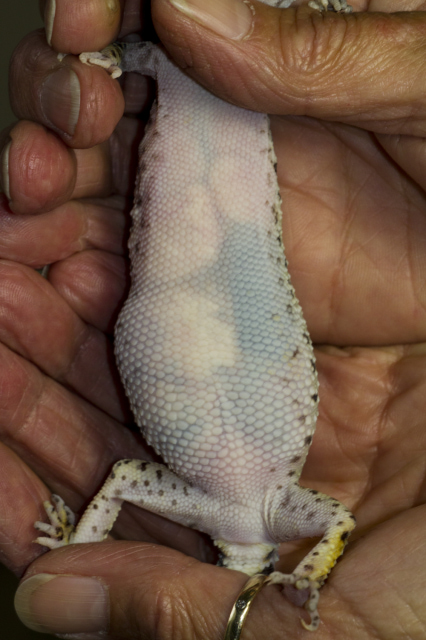 Belly photo
Belly photo
species - leopard gecko.
habitat size - 60x45x45cm
substrate - reptile carpet
humidity - N/A
bask/ambient temps - Hot side varies 30-32.
lighting: wattage, brand, and type of UVB - Lighting not used.
vet history - When I got her 5years ago she had a gut infection which went away with a long course of anti biotics. Recent vet info is below..
all food offered; feeding schedule; supplements and schedule; when and how water is given; She gets offered 3 locusts every other day out of her tank (so she doesn't fight with male). vitamins dusted on food once a week with calcium in tank for them to lick when needed. Water bowl in tank which is regularly changed.
last time ate; explained below..
when last defecated; seems to go every other day
captive bred or wild caught - believe she is captive bred, got her from a rescue.
shed recently - Shed about 3 times in the last month due to being fed 1ml of carnivore care (liquid food) a day, to help her put weight on. Usually struggles shedding on her head (the male who she shares with never needs help)
other animals living in same terrarium? 1 male who is said to have always been with her.
Hi there,
I was wondering if you may able able to help me. I have a female leopard gecko of about 12years old. I got her from a rescue about 5years ago and since having her she has never really been able to maintain or gain weight. She shares her tank with a male gecko (I got them together and was told they'd always been together). He gains weight every month or maintains, so it's not food or environment problems..
After her weight getting too low I took her to my local vets who have done a faecal test which showed a small amount of flagellates. These have since been removed however she still can't hold any weight, only lose. She is on 1ml of carnivore care a day, which is helping her to gain weight, but this is obviously something she can't stay on forever. Since then my vet has 'luminated' her as her belly is also very swollen at the back half. From this he still wasn't sure what the problem was and has sent some pictures I have of her belly off, but we still haven't got anywhere. He also tried a shot of anabolic steroids incase it was fatty liver and to increase her appetite, however it actually made her stop eating. She usually loves her live food (locusts)and eats without fail, so the steroids didn't seem to help. The last 3 feeds she has suddenly stopped eating them, however I took her off the carnivore care (as she doesn't like it) and she is now eating lives again. I have been going to the vets over 2months now and she isn't improving, I am very worried about her... Attached is the shot of her belly my vet has sent off.
Hope i've answered this thoroughly enough, any advice of what it could be for me to discuss with vet would be great..
Many thanks
Alannah
AnswerWhat is the status of this consult? You asked for my help and did not follow up so that I can close the case.
-------------------------------------------------------------------
Can you provide additional photographs of her from different angles.
Please clarify "locust". Do you mean crickets, or grasshoppers, or what species exactly? How large are the food items? And are these the only food items you have given her regularly or in the recent past? You use no lighting whatsoever?
I also need the following answered:
Has she ever produced eggs?
Does the supplement you use contain D3?
How much carnivore care is mixed with the water?
What flagellates were identified?
What specific medication was used and at what dosage and duration to clear her of the flagellates?
Did this issue with the swollen abdominal cavity happen before or after the anti-parasitic treatment?
Is her feces and urates solid and of normal color?
Does she appear to have any anemia?
Carnivore care might not be appropriate unless it is very dilute. It has a high protein content which can be hard on kidney function, especially in an older animal, and it has a fairly high fat content. Critical care for herbivores may be more appropriate.
My initial impression from the only photo is that this appears to be steatosis/hepatic lipidosis, possibly having progressed into steatohepatitis, and possible other visceral adipose deposits on the right side, progressing cranial. This is not a very good prognosis if it is. Alternatives are visceral gout or dystrophic calcification, but it doesn't appear so. I cannot examine personally, so I will need better photos. I would advise you vet do a radiograph and check for opacity and define the borders of the liver if possible. A radiograph and some basic palpation and illumination should be able to determine if the distended lower abdomen is due to enteritis, hepatomegaly, or hydroperitonium. The later would fit with cirrhosis resulting from steatosis.
Damage may be reversible or it may not be. I would probably screen again for parasites, specifically liver flukes. Ivermectin is also known to lead to hepatic lipidosis, so the time frame between when she was treated, with what, and when she developed the current condition may be relevant.
At any rate, with relation specifically to possible steatosis I would recommend dietary alteration. It's common for captive geckos without sufficient exercise space and fed typical farm raised fatty feeders to develop steatosis. And I consider your terrarium to be far too small for sufficient exercise, and I also recommend low intensity UVB lighting be used with Leopard Geckos. I also recommend using small numerous feeders as opposed to a few large ones, and I recommend feeders that have softer exoskeletons as excessive breakdown of chitin leads to lowered gut motility and elevated levels of non-protein nitrogenous wastes, which is harder on the kidneys.
Medications that may be helpful are Vitamin E treatment 1 IU/kg, Choline 40-50mg/kg or the possibly safer precursor Methionine, or again the steroids which I would consider a last resort - Thyroxine 20mg/kg Q. 48H, or Nandrolone .5-5mg/kg IM Q. 7-28D.
=======================================
You asked for my help. I had additional questions for you to follow up with. What is the status of this consultation?


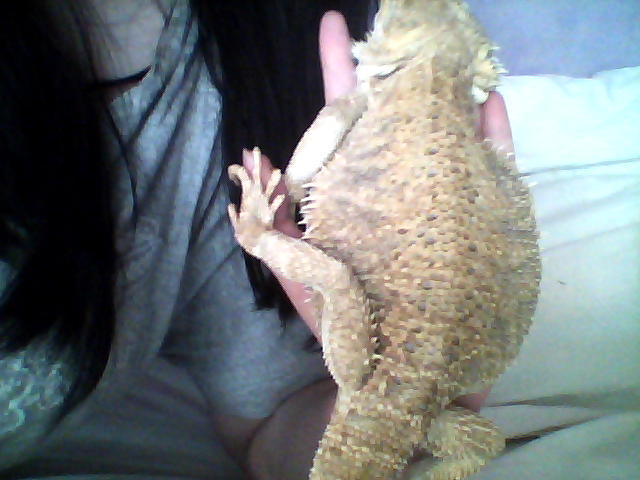 New bearded dragon hi tracie
Question
little skinny perhaps
Hi Tracie...
I tried to
New bearded dragon hi tracie
Question
little skinny perhaps
Hi Tracie...
I tried to
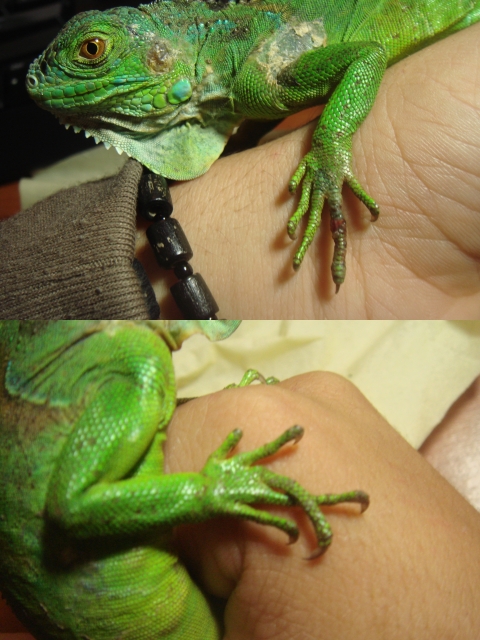 Iguana toe problem...
Question
toe problems
Hey there,
I adopted a baby iguan
Iguana toe problem...
Question
toe problems
Hey there,
I adopted a baby iguan
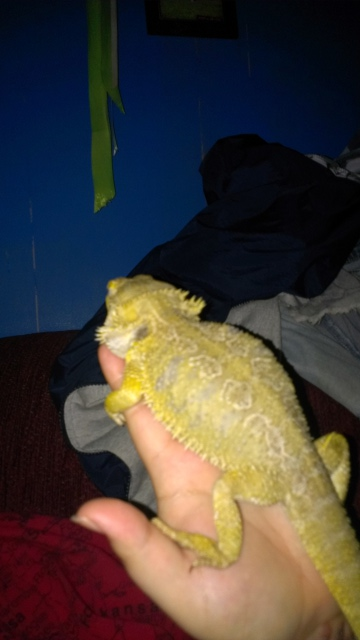 best way to get my beardie to interact and used to being in the floor
Question
asleep in my hand
My name is Dana my be
best way to get my beardie to interact and used to being in the floor
Question
asleep in my hand
My name is Dana my be
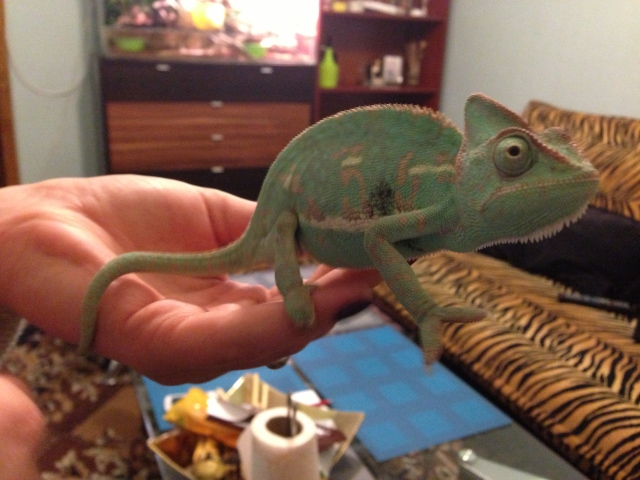 chameleon has developed a black spot on its side
Question
Black spot Black spot close up
sp
chameleon has developed a black spot on its side
Question
Black spot Black spot close up
sp
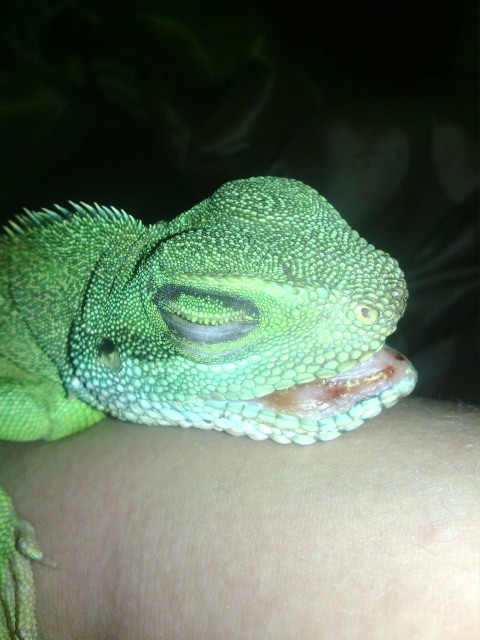 urgent heath question
Question
godzilla godzilla
My sons water d
urgent heath question
Question
godzilla godzilla
My sons water d